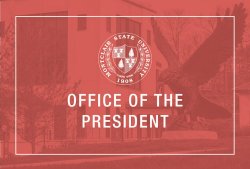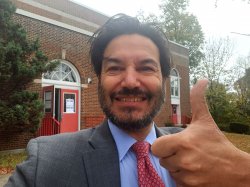Election Day Message From the President
Posted in: Uncategorized

I cast my ballot this morning and encourage everyone to head to your polling place if you have not already voted.
Like many Americans, I now anxiously await the results of today’s elections. It has been a contentious campaign with stark differences on a variety of crucial issues – climate, immigration, the economy, abortion, criminal justice, American foreign policy – making it clear that much hangs in the balance. Of course, there is more to this presidential contest than competing policy platforms or even alternate visions of where the country is and where it should be going.
This election – the way it is carried out, the way the results are accepted, the way its outcomes are implemented – is likely to say a lot about the trajectory of American democracy. One candidate has made the trustworthiness of our electoral machinery an issue, of course, but this critique extends back well beyond four years. More than ever, the administration of elections is now a contentious battleground and both major political parties see the perversion of legitimate voter expression as a major threat.
That means that the outcome of the presidential election – which seems unlikely to be known tonight given the closeness of the race – may not be accepted as a bonafide expression of the popular will by a substantial portion of the population. This, in some ways, reflects a broader reality that we live in a time where we share a nation but not one reality. Our understanding of the world – its problems and solutions, its heroes and demons – is so heavily shaped by segmented media that even intelligible disagreements are elusive, let alone constructive discourse. Our ability to function as one country is openly questioned.
So I am anxious to know not just who wins but how we handle the results. Will we find reasons to remain a unified nation and overcome the forces driving us apart? I believe that universities – including this university – have a critical role to play in the maintenance of American democracy. And therefore, we should be working to ensure an affirmative answer to this question.
Montclair was born as a place to train teachers, reflecting a belief that education provides tools required for democracy. That includes the ability to speak but also the ability to listen, the power to advocate but also the power to learn, the strength to take principled positions but also the strength to find common ground with those we oppose.
It also means understanding our history to illuminate the contemporary challenge. We are not the first Americans to confront a close election in a time of great division. This is not some glib assurance that everything is going to be okay. Indeed, one time “we were here before” was 1860; the election of Abraham Lincoln was understood by many even at the time to make our nation’s bloodiest war inevitable. But that was not the first or last time an election threatened to tear the nation asunder; we have forgotten the fragility of American democracy is a longstanding feature of our nation.
I recently participated in a campus panel with Chuck Todd (NBC News’ chief political analyst and former moderator of “Meet the Press”) and Dr. Lindsay Chervinsky (award winning author on presidential history and Executive Director of the George Washington Presidential Library). During our conversation we looked at contemporary events through the lens of Chervinsky’s book examining the election of John Adams as our second president in 1796. In that case, it was unclear whether the contentious adversaries would choose the continuity of the very young country – and more specifically its nascent constitutional government – over claims to power in the face of narrow election loss. Adams, his opponent Thomas Jefferson, and a host of flawed characters ultimately did just that – and established a model for a peaceful democratic transition of power that has largely stood since.
Even murkier outcomes have characterized other American presidential elections and, with the one big exception already noted, the adversaries figured out a way to move forward as a whole nation. In one case, moving forward involved a morally suspect compromise that had horrific, long-lasting consequences; the election of 1876 and its aftermath effectively ended Reconstruction and launched the violence and injustice of the Jim Crow era. In another case, the 2000 Bush v. Gore contest, the resolution required acceptance of what many people felt was a very partisan judicial decision as the voice of constitutional order.
The point is not that everything will be all right. Rather, it is a reminder that the American democratic experiment has often been chaotic and ugly. We are only having this conversation, however, because even in the face of sedition, assassination, and a variety of outrages, our predecessors chose continuity of governance rather than risk it all in pursuit of political advantage or preferred outcomes.
Why? Cynics might say that it was – and always is – about the money, and there is some truth to that. The collapse of the United States of America would cost a lot of people a lot of wealth. But I think our shared attachment to the country, even when we’ve been quite divided, is rooted in something deeper. The ideals articulated in the Declaration of Independence and the Constitution – liberty, equality, opportunity – transcend any partisan agenda. The possibility that a nation can be ruled by laws above which no citizen may rise and be grounded in respect for each other’s rights (notwithstanding profound disagreements regarding the meaning of these words) remains appealing even if we have continually struggled to live up to these standards. These are ideals worth struggling to achieve, together.
And so we should be thinking now of what we will do – and will not do – to preserve our nation and American democracy regardless of how events unfold after November 5, 2024. How will we work to promote reconciliation when raw feelings of division will deepen already profound cleavages? How will we ensure that fidelity to the laws, rules and norms that make our democracy function remains a requirement? How can we best do our part to realize the vision articulated nearly 250 years ago when we know there are severe doubts about the viability of the polity?
Regardless of the outcomes of this election, let us embrace the civic virtues of understanding, patience, and humility. I encourage these virtues – not in spite of our differences or out of some naive optimism – but because history teaches us that in times of rancor and partisanship, these civic virtues have proven as important to our nation’s resilience as ardor, bravery, and patriotism.

